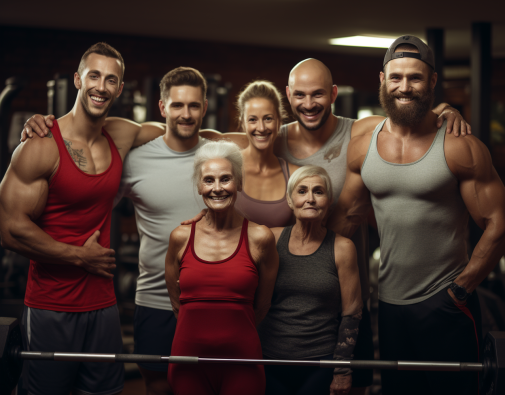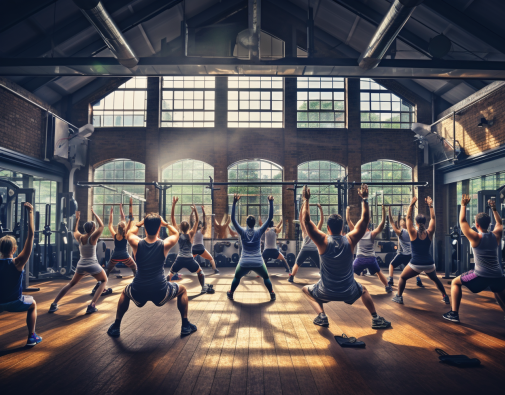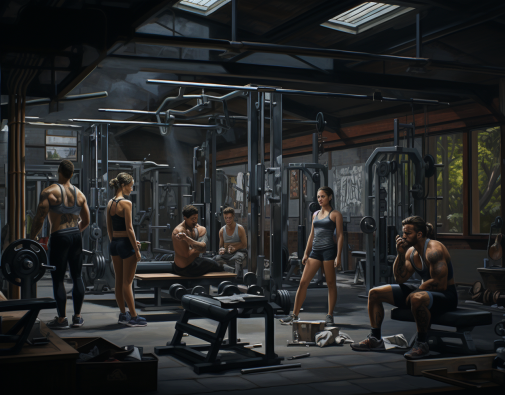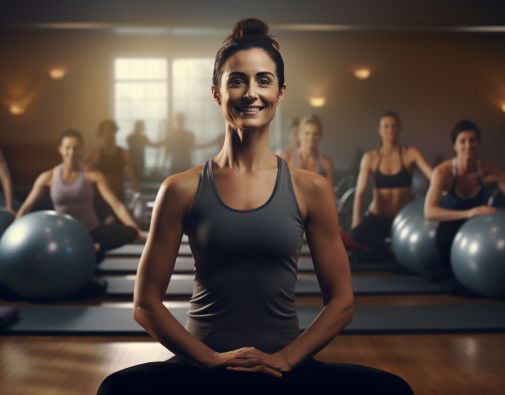Elevating Lives - Shaping Futures
Physical Activity




Unlock The Power Of Movement
Physical activity is a cornerstone of healthy living, offering a myriad of benefits that extend well beyond mere physical fitness. Embracing an active lifestyle is not just about improving how you look, but more importantly, about enhancing how you feel and function. It’s an investment in your most valuable asset – yourself.
Why Movement Matters
- Enhanced Physical Health: Regular physical activity strengthens your heart, improves lung capacity, and increases endurance. It’s a proven way to combat obesity, reduce the risk of chronic diseases such as heart disease, diabetes, and certain cancers, and it even boosts your immune system.
- Mental Clarity and Emotional Wellbeing: Exercise is a natural mood lifter. It releases endorphins – the feel-good hormones, reduces stress, anxiety, and symptoms of depression. It also sharpens your memory and cognitive functions, making you more alert and focused.
- Longevity and Quality of Life: An active lifestyle can add years to your life and life to your years. Staying physically active means maintaining your independence and ability to perform daily tasks well into your later years.
Starting Your Journey
- Assess Your Current Fitness Level: Understand where you are starting from. This might involve checking your baseline fitness measurements such as BMI, flexibility, and cardiovascular health.
- Set Realistic Goals: Whether it’s walking a certain number of steps daily, joining a fitness class, or training for a 5K, setting achievable goals helps in keeping you motivated.
- Choose Activities You Enjoy: From swimming to yoga, cycling to dance classes – find what you love to do. Enjoyment is key to sustainability.
- Incorporate Strength Training: Muscle health is vital. Include strength training exercises to build muscle mass and improve metabolism.
- Stay Consistent: Consistency trumps intensity. Regular, moderate activity is better than occasional high-intensity workouts
Keeping It Safe & Enjoyable
- Consult with Professionals: Before starting any new exercise regime, particularly if you have existing health concerns, consult with healthcare professionals.
- Listen to Your Body: Pay attention to what your body tells you. Rest when needed and avoid pushing through pain.
- Stay Hydrated and Nourished: Proper nutrition and hydration are essential for performance and recovery.
- Find a Support System: Whether it’s a workout buddy, a fitness group, or an online community, having support can boost your motivation and enjoyment.
- Track Your Progress: Keep a journal or use apps to monitor your progress. Seeing improvements over time can be a great motivator.


Tips For Success
Embracing physical activity as a key part of your life is a journey filled with highs and lows. To help you stay on track and make this change a lasting one, here are some practical and effective tips for success:
Set Clear, Achievable Goals
- Start Small, Dream Big: Begin with manageable goals and gradually build up. Progression is key to avoiding burnout and injury.
- Be Specific: Rather than vague goals like “get fit,” aim for specific targets, such as “walk 30 minutes a day, five days a week.”
Incorporate Variety
- Mix It Up: A mix of cardiovascular, strength, and flexibility exercises keeps your routine balanced and interesting.
- Try New Things: Experiment with different activities to find what you enjoy most and to challenge your body in new ways.
Create A Routine
- Schedule It: Treat your workout time like any important appointment – schedule it and stick to it.
- Routine, but Flexible: While consistency is key, be flexible enough to adapt your workout schedule as needed.
Focus on the journey, not the destination
- Celebrate Small Wins: Acknowledge and celebrate every small victory along the way. This helps in building confidence and motivation.
- Enjoy the Process: Find joy in the activity itself, not just the results. This shift in perspective makes exercise more of a pleasure than a chore.
Stay Informed & Educated
- Keep Learning: Stay updated with reliable information on fitness and health. This helps in making informed choices about your routine.
- Seek Professional Advice: Don’t hesitate to consult fitness experts or trainers, especially when starting out or when progressing to more advanced levels.
Monitor Your Progress
- Track Your Activities: Use apps, journals, or fitness trackers to monitor your progress. This can provide a visual representation of your achievements.
- Adjust as Needed: Regularly review your progress and adjust your goals and methods accordingly.
Build A Support Network
- Find a Community: Join groups, classes, or online forums where you can share experiences and get encouragement.
- Involve Friends and Family: Having a support system can greatly increase your motivation and the fun factor of your workouts.
Prioritise Recovery
- Rest is Essential: Incorporate rest from specific activities into your routine to allow your body to recover and reduce the risk of injury.
- Listen to Your Body: Pay attention to signs of overtraining and ensure you are getting adequate sleep and nutrition.
Keep It Fun & Rewarding
- Reward Yourself: Set up a reward system for reaching your goals. This could be as simple as a relaxing bath after a week of workouts or a new workout gear for a month of consistency.
- Stay Positive: Maintain a positive mindset. A little self-compassion on tougher days goes a long way.


Elevate Your Well-Being
Physical activity is not just a means to an end; it’s a powerful tool to elevate your overall well-being. This journey is about more than just fitness – it’s about creating a harmonious balance in your life that nurtures your physical, mental, and emotional health. Here’s how you can use physical activity to elevate your well-being:
Embrace Holistic Health
- Mind-Body Connection: Recognise that physical health and mental health are deeply interconnected. Exercise can be a form of meditation, helping to clear your mind and reduce stress.
- Emotional Balance: Regular physical activity can improve your mood and increase feelings of happiness and fulfillment.
Create A Positive Lifestyle Shift
- Build Healthy Habits: Let exercise be a part of a broader shift towards a healthier lifestyle. This includes proper nutrition, adequate sleep, and stress management.
- Consistency Over Intensity: Consistently engaging in moderate physical activity is more beneficial than occasional extreme workouts.
Cultivate Mindfulness & Self-Awareness
- Mindful Movement: Practice being present during your workouts. Focus on your breathing, your movements, and how your body feels, fostering a deeper connection with yourself.
- Listen to Your Body: Develop an understanding of your body’s needs and limitations. This self-awareness can guide you in making healthier choices and avoiding injuries.
Strengthen Social Networks
- Community Engagement: Participate in group activities or sports. These can provide a sense of community and belonging, which are crucial for emotional well-being.
- Social Support: Share your fitness journey with friends or family. Having a support system can boost your morale and keep you motivated.
Enhance Self-Esteem & Confidence
- Celebrate Achievements: Acknowledge your progress, no matter how small. Achieving fitness goals can significantly boost your self-esteem and confidence.
- Empowerment Through Challenge: Overcoming challenges in your fitness journey can empower you in other areas of your life.
Maintain Balance & Flexibility
- Adapt and Modify: Be open to modifying your fitness routine as your life changes. Flexibility in your approach can help maintain a sustainable and enjoyable regimen.
- Find Your Rhythm: Discover the best times for physical activity that align with your natural rhythms and lifestyle.
Continuous Learning & Growth
- Stay Curious: Explore new forms of physical activity and keep learning about health and wellness. This continuous growth keeps your journey exciting and fulfilling.
- Self-Reflection: Regularly reflect on your journey and the positive changes you’ve experienced. This reflection can be a source of motivation and gratitude.


Overcoming Barriers
Embarking on a fitness journey is admirable, but it’s not without its challenges. Recognising and overcoming common barriers is crucial to maintaining a healthy lifestyle. Here’s how you can navigate these obstacles:
Time Constraints
- Integrate Activity into Daily Life: Short on time? Incorporate physical activities into your daily routine. Take the stairs, go for a walk during lunch, or do a quick workout at home.
- Schedule Workouts: Treat exercise like any other important appointment. By scheduling it, you prioritise it amidst a busy lifestyle.
Lack Of Motivation
- Set Achievable Goals: Start with small, attainable goals to build momentum and confidence.
- Find Your Why: Understand the deeper reasons behind your desire to stay fit. Whether it’s for health, stress relief, or personal achievement, keeping your ‘why’ in mind can fuel your motivation.
Financial Constraints
- Low-Cost Options: Explore free or low-cost exercise options like walking, running, or home workouts. Many online platforms offer free fitness content.
- Community Resources: Utilise local community centers or parks, which often provide affordable exercise opportunities.
Physical Limitations Or Disabilities
- Consult Health Professionals: Work with healthcare providers or fitness experts to tailor a program that accommodates your needs.
- Adaptive Exercise Programs: Seek out exercise routines specifically designed for individuals with physical limitations or disabilities.
Fear Of Injury Or Health Concerns
- Start Slowly: Gradually increase the intensity of your workouts to reduce the risk of injury.
- Learn Proper Techniques: Educate yourself on correct exercise forms or work with a trainer to ensure you’re exercising safely.
Social Anxiety Or Intimidation
- Begin with Home Workouts: If gyms feel intimidating, start with exercises you can do at home until you build confidence.
- Find a Supportive Community: Look for fitness groups or classes that cater to beginners or those with similar concerns.
Continuous Learning & Growth
- Educational Resources: Utilise our site, books, online articles, and videos to learn about different types of exercises and proper techniques.
- Professional Guidance: Consider investing in a few sessions with a personal trainer to get started on the right track.